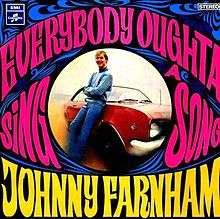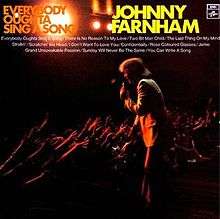Everybody Oughta Sing a Song
Everybody Oughta Sing A Song is the second solo studio album by Australian pop singer John Farnham (billed then as Johnny Farnham) and was released on EMI Records in November 1968.[1][2][3] Its first single, released in July, was the double A-sided, "Jamie"/"I Don't Want To Love You", which peaked at No. 8 on the Go-Set National Singles Charts.[1][4] The second single, "Rose Coloured Glasses" was released in October and peaked at No. 16.[1][5] Writers on the album included Hans Poulson, Neil Diamond and Quincy Jones. The album was re-released in 1974 with a different cover, it shows Farnham performing live on stage, whereas the initial 1968 release had him leaning against a Holden Monaro (see infobox at right).
| Everybody Oughta Sing A Song | ||||
|---|---|---|---|---|
 | ||||
| Studio album by | ||||
| Released | November 1968 | |||
| Recorded | 1968 | |||
| Genre | Pop | |||
| Label | EMI, Columbia | |||
| Producer | David Mackay | |||
| Johnny Farnham chronology | ||||
| ||||
| Singles from Everybody Oughta Sing A Song | ||||
| ||||
| 1974 Re-release | ||||
 Alternative cover for "Everybody Oughta Sing A Song." | ||||
Background
Johnny Farnham's first commercially successful solo recording was the novelty song entitled "Sadie (The Cleaning Lady)", his manager, Darryl Sambell had disliked it as the lyrics were so persistent.[2] However, EMI's in house producer, David Mackay, insisted and so the single was released in November 1967. "Sadie" hit No. 1 on the Go-Set National Singles Charts in January 1968 and remained there for five weeks.[6] Selling 180 000 copies in Australia, "Sadie" was the highest selling single by an Australian artist of the decade.[2][3] Farnham's first album, Sadie, produced by Mackay was released in April.[7] Almost immediately, Farnham was recording his second album, Everybody Oughta Sing A Song with Mackay producing.[7] The first single from the album was released in July, the double A-sided, "Jamie" / "I Don't Want To Love You" which peaked at No. 8.[1][4] It was followed by the second single, "Rose Coloured Glasses" which peaked at No. 16.[1][5] while the album itself was released in November.[1]
Track listing
- "Everybody Oughta Sing a Song" (Dallas Frazier) – 2:18
- "Jamie" (Hans Poulsen) – 2:28
- "There Is No Season to My Love" (Quincy Jones, Dorothy Fields) – 2:24
- "Two-Bit Manchild" (Neil Diamond) – 3:01
- "The Last Thing on My Mind" (Tom Paxton) – 3:27
- "Strollin'" (Ralph Reader) – 1:59
- "Scratchin' Ma Head" (Guy Fletcher, Doug Flett) – 2:07
- "I Don't Want To Love You" (Don Everly, Phil Everly) – 2:48
- "Confidentially" (Reg Dixon) – 2:03
- "Rose Coloured Glasses" (Hans Poulsen) – 2:49
- "Grand Unspeakable Passion" (Peter Best) – 2:12
- "Sunday Will Never Be The Same" (Eugene Pistilli, Terry Cashman) – 2:58
- "You Can Write a Song" (Roger Cook, John Neel) – 2:38
References
- McFarlane, Ian (1999). "Encyclopedia entry for 'John Farnham'". Encyclopedia of Australian Rock and Pop. St Leonards, NSW: Allen & Unwin. ISBN 1-86508-072-1. Archived from the original on 29 August 2004. Retrieved 4 September 2009.
- Jenkins, Jeff; Ian Meldrum (2007). Molly Meldrum presents 50 years of rock in Australia. Melbourne, Vic: Wilkinson Publishing. ISBN 978-1-921332-11-1. Retrieved 5 September 2009.
- Creswell, Toby; Samantha Trenoweth (2006). 1001 Australians You Should Know. North Melbourne, Vic: Pluto Press. p. 84–85. ISBN 978-1-86403-361-8. Retrieved 4 September 2009.
- "Go-Set search engine results for "Jamie"". Go-Set. Waverley Press. Retrieved 5 September 2009.
- "Go-Set search engine results for "Rose Coloured Glasses"". Go-Set. Waverley Press. Retrieved 5 September 2009.
- "Go-Set search engine results for "Sadie (The Cleaning Lady)"". Go-Set. Waverley Press. Retrieved 5 September 2009.
- Holmgren, Magnus; Reboulet, Scott; Albury, Lyn; Birtles, Beeb; Warnqvist, Stefan; Medlin, Peter. "John Farnham". Passagen.se. Australian Rock Database (Magnus Holmgren). Archived from the original on 27 November 2013. Retrieved 15 May 2014.